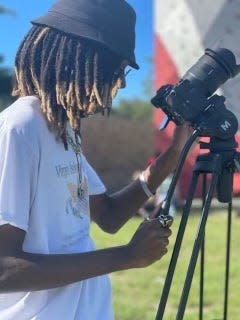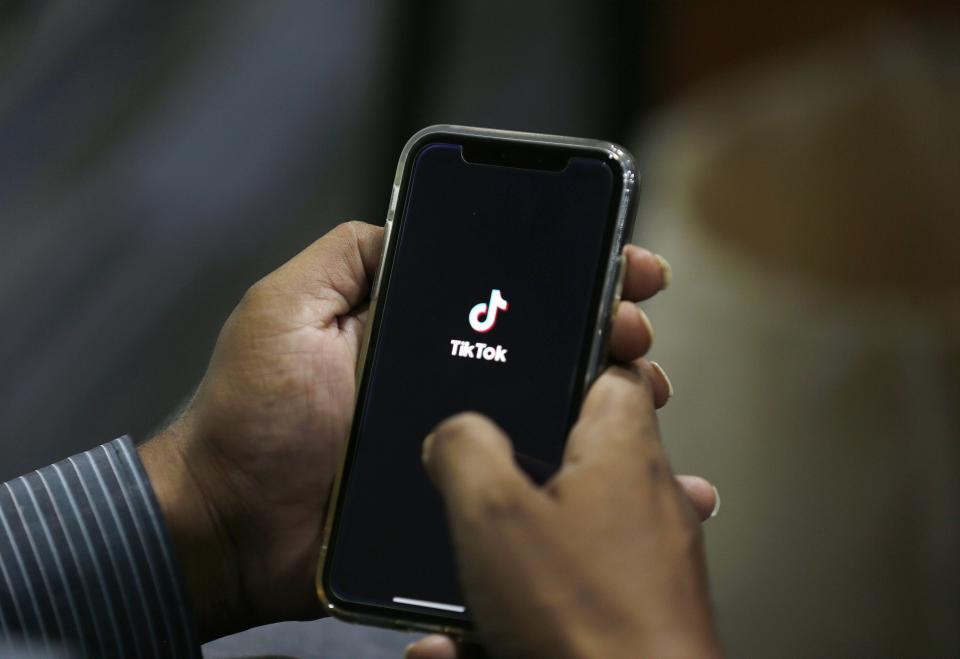TikTok ban is in effect at Florida universities and FAU students are confused, unhappy
- Oops!Something went wrong.Please try again later.
BOCA RATON — Universities across Florida will now be prohibited from using campus Wi-Fi or school-owned devices to access the popular app TikTok after a recent decision from the Florida Board of Governors.
The ban includes the state's largest institutions with hundreds of thousands of students, including Florida Atlantic University, the University of Florida, Florida State University and the University of South Florida and others.
"It's just hard to connect to the student base without the main platform that most Gen Z's are on," said Pete Gordon, a 22-year-old senior said Thursday on FAU's campus in Boca Raton.
Gordon, who manages the college TV station, said he tried to reach the next TikTok video in his feed Wednesday morning when the screen wouldn't load.
TikTok is a short-form, video-sharing app that allows users to record and edit content. It is owned and operated by the company ByteDance, headquartered in Beijing, China. Members of Congress held a hearing two weeks ago to discuss the potential harm of the app, with some suggesting it was a tool of the Chinese government data to gather data on U.S. residents, or a way to push messaging onto minors.
8 Florida universities have banned TikTok. Here's what you need to know:
More: FSU bans TikTok, other apps from campus after statewide regulation from Board of Governors
Florida's policy is in compliance with an emergency regulation adopted by the State University System Board of Governors on March 29. The regulation references the State University System’s prohibited technologies list, and requires apps like TikTok to be removed from all university-owned devices immediately.
Like many other students, Gordon has relied on his cellular data to access the app. He doesn't live on campus, though, where many of the dorms don't have the same, reliable access to cellular data that he does.

"You get influenced of what trends to do from TikTok that other students just know about, and you just can't do anymore," Gordon said of following TikTok trends to connect with students on campus. "It just makes it our job harder."
Olivia Lawson, an 18-year-old freshman, was on campus Thursday afternoon when she encountered the same issue as Gordon. The videos on her TikTok feed appeared to be there, but none were loading.
"As a student, I feel I use TikTok a lot, especially coming into FAU for just finding ways to connect with people," she said. "So it's kind of hard now that we can't use it here. I know student government has TikTok, all of these organizations have TikToks, just talking about different events or doing different things.

"Nobody told us it was happening. We all just kind of figured out TikTok wasn't working on our phones when we were connected to the Wi-Fi. And everybody's like, in all of our housing group chats, everybody's freaking out. They're like, 'Why isn't TikTok working?'"
Lawson, like Gordon plans to use her cellular data to access the app. But from her dorm, service is spotty, so she has to make her way to the middle of campus until it works properly. Even with that, she doesn't expect to use TikTok any less.
"TikTok is just a way to connect with everybody," she said, adding that it speaks "toward our generation of students right now.".
Similar notices went out to students at other schools
An email sent to UF employees and students late Wednesday indicated that no one is to use TikTok through the university's network due to potential security risks. Along with Tencent QQ, WeChat, VKonatke and Kaspersky, TikTok is also now prohibited for use in any UF marketing or advertising initiatives.
UF also urged deleting such apps from personal devices, saying it would protect personal and university data.
“The university treats the protection of UF data — academic records, research, financial information, and other sensitive, personally identifying information — as an institutional priority,” the email read.
UF previously sent an email to students and faculty on Jan. 12 that discouraged the use of TikTok and suggested removing the app on all devices due to data-collection concerns. Students, however, said they intend to keep using it and suggested that the administration was overreacting.

While at an event in Daytona Beach in Febuary, UF President Ben Sasse said that China could shut down "huge portions of the U.S. economy" if it wanted to use collected data from users.
"Shout out to all of those that think TikTok is anything other than a tool of the Chinese government," said Sasse to the crowd, adding his record for supporting bills that restrict what apps can do. "These are fake private-sector companies that are really controlled by the national security laws of China to try gather more and more big data."
To date, there has been no proof provided that shows the app is operated by the Chinese government to steal information from users. The company's terms of the agreement are similar to other popular apps, such as Instagram and Snapchat.
What do students have to say?
While UF technically has the right ban TikTok from its network and devices, Alyssa Knappen, a 20-year-old UF history junior, said the criticism should also apply to other platforms that have similar privacy concerns.
“Its privacy issues are the same as Facebook and Instagram,” she said. “If they’re going to ban one, then they should apply that rule to all of the social media.”
Julia Graddy, a 19-year-old UF freshman, echoed the sentiment. She called the ban a step in the right direction for protecting privacy but felt singling out TikTok was strange.
“I don't really understand what makes TikTok unique from Facebook, Instagram or anything like that,” Graddy said. “I think all these apps are doing the same thing. It just happens to be owned by a foreign (company).”

Other states, such as Connecticut and Ohio, are considering limiting some platforms
Florida is not the only state taking aim at social media regulation. Ohio and Connecticut also are considering legislation requiring parental consent for a minor to sign up for a social-media account. Federal legislation in Congress mirrors that stipulation.
University officials at the Board of Governors' January meeting expressed support for banning the application within public university networks based on security concerns.
The University of Florida was one of the first public institutions to discourage students from using the application in a university-wide email. Eldayrie wrote in the email that there was a “strong possibility” it would be banned on university devices and networks, as first reported by WUFT, the public broadcast station in Gainesville.
States all over the country, including Texas and Georgia, have banned the application on government-issued devices as well.
Data privacy has been a lasting conversation in Florida
In 2021, DeSantis signed a controversial social media regulation law that he said at the time would prevent social media companies from censoring conservative viewpoints. Specifically, he pointed to the removal of former President Donald Trump’s Twitter account following the Jan. 6 U.S. Capitol insurrection.
During a speech at Palm Beach Atlantic University in West Palm Beach in February, DeSantis reiterated that his goal is to empower Florida residents who were removed from social media platforms “based on viewpoint."
“We wanted the Floridians who've been affected to be able to bring consumer fraud actions against Big Tech,” DeSantis said.
Attorney General Ashley Moody, who attended the PBAU news conference, talked about data privacy and protecting children online. She referenced location-tracking concerns for children on social media, a concern the governor said needs to be addressed as part of his administration’s mission to “support parent’s rights in the state of Florida.”
“I am grateful that we have a governor here and legislators and concerned citizens that are pushing for federal laws, pushing for protection of Floridians against potentially threatening violations of privacy and sensitive information,” Moody said.
Gannett Florida Network correspondent Nora O'Neill and Palm Beach Post staff reporter Stephany Matat contributed to this report.
Jasmine Fernández is a journalist covering Delray Beach and Boca Raton at The Palm Beach Post. You can reach her at jfernandez@pbpost.com and follow her on Twitter at @jasminefernandz. Help support our work. Subscribe today.
This article originally appeared on Palm Beach Post: DeSantis called for ban of TikTok use through networks of universities

